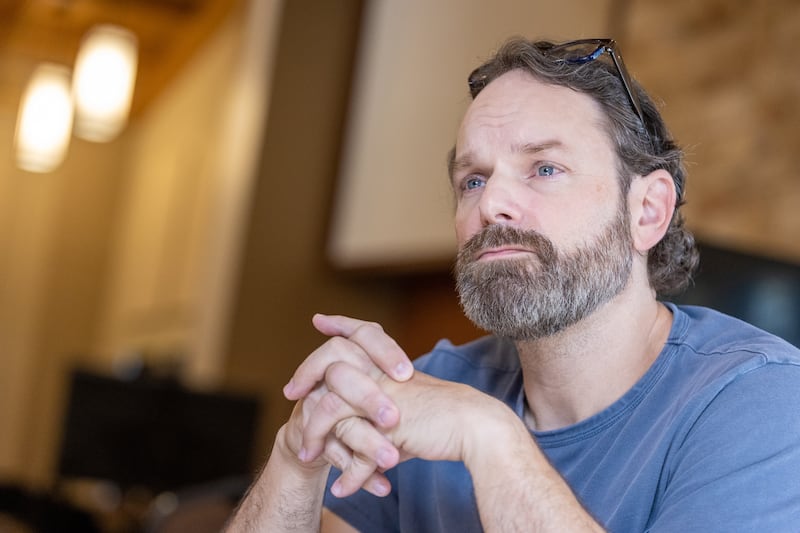MIDLOTHIAN, Texas — In 2017, three writers — Dallas Jenkins, Ryan Swanson and Tyler Thompson — sat together in the basement of a home in Elgin, Illinois.
Thompson remembers the room had candy apple red walls and was cluttered with exercise equipment as they began brainstorming a screenplay.
From that humble scene emerged the first script for “The Chosen,” a popular faith-based series on the life of Jesus Christ.
“We just started dreaming up ideas and the rest is history,” Thompson said. “We’ve kept the writers room to just the three of us. Obviously, there has been ups and downs, ‘What about this? What about this?’ — but ultimately we always came together.”
The story goes that Jenkins and Thompson began working together on “The Shepherd,” the short film that served as a pilot episode for “The Chosen” and generated more than $10 million through crowdfunding to launch the series.
When the original script for “The Shepherd” was completed, Jenkins told Thompson he wanted to have a “real professional, seasoned screenwriter with a ton of experience” in Los Angeles read it. That screenwriter was Swanson.

As it turns out, the candy apple red basement where the trio wrote the script also happened to be the same home Swanson’s family lived in when he was a baby.
“It was a very full-circle moment,” Swanson said with a smile.
In addition to working on “The Chosen,” Swanson is known for his work as a writer and producer on such films as “Mr. & Mrs. Smith” and “Drop Dead Gorgeous.”
Thompson has worked as a videographer and co-writer with Jenkins on multiple projects and short films portraying Jesus for their church.
Swanson has a minor in religious studies and Thompson says he has an “undergraduate understanding” of the Old Testament. Both have spent a lot of time in the Bible as they write for the show.
Thompson and Swanson discussed their experiences in co-writing “The Chosen” with the Deseret News and other news media in mid August at Camp Hoblitzelle, a camp located south of Dallas where cast and crew are filming Season 3.
Note: This interview has been edited for length and clarity.
Deseret News: How did you approach writing “The Chosen”?
Ryan Swanson: It’s a team thing, and we had the Bible. We picked the bookends and from there we figured out the eight points we want to hit every season like a part of an act. So it’s a three-act story. We’ve got Seasons 1 and 2, they were Act 1. Seasons 3, 4 and 5 will be Act 2, and then we will be in the home stretch for Seasons 6 and 7. That’s what is planned and we do that together.

Tyler Thompson: The Bible is great literature. We are fortunate to be working with source material. Not all sacred texts of religion are so linear. Sometimes it’s just collections of wisdom, sayings or laws. At least this section of the Gospels is very much a story, so we are working with a fantastic foundation. And within that source text, there’s plenty of space between the lines of what is said to explore what is the motivation for these characters? Why would they say that? Why would they do that? That’s something that other projects have explored less.
RS: And to your question, we fulfill Dallas’ vision. We could not have freestyled how much time we were going to spend on one particular section. He definitely wants to tell this story in a certain way and parts of it have crystallized for him in his sleep 10 years ago. So we come very much trying to execute that.
DN: It’s fascinating to watch the story play out with developed characters and backstories, such as Mary’s battle with personal demons or Simon Peter’s debt leading to the miracle of the full fish nets. How do you explore and create a character’s motivation from “between the lines?”

RS: In a lot of ways it started with reverse engineering the characters. What was their existence like? What did they leave behind in terms of acts or literature? What critical parts of the Bible were they a player in? Knowing Simon Peter’s arc, we began to look at those moments of behavior that characterize him — the frequent disagreement, the sort of oblivious stumbling, the bombastic, and also his profound ability to lead, as well as Jesus’ trust in Peter, the rock. So we began to build in characteristics.
Then we had a midpoint. This is the place the Bible meets what we do. We needed Peter’s calling to be in a significant place because meta-textually it is significant. As a leader of the church, his calling mattered. So we put it at a moment of prominence, which is right in the middle of Season 1.
Miracles are inherently anti-dramatic. It’s a character who didn’t do anything, didn’t deserve, who didn’t follow a series of steps to overcome to be victorious. It is Jesus gracing a character with, in this case, deliverance. We wanted the audience to feel the full weight of what that miracle meant to Peter. To do that, we created a situation where using what we felt was a true set of characteristics for Peter — what scrape could he have gotten himself into where he, a professional fisherman, would have to fish all night and come up with nothing?
DN: In Season 2, viewers see Jesus devote serious time to crafting, writing and practicing his profound Sermon on the Mount, which is interesting. How did you decide to portray it that way?
RS: That was a moment. Not everybody saw it that way, and that’s OK. That idea started with Tyler and Dallas to explore the fully man part of Jesus. I feel like the Old and New Testaments are tracking God learning to deal with his creation. It’s not that Jesus doesn’t know these things, doesn’t know how they will all turn out to an extent the father does. Jesus is trying to make his message reach people, who are imperfect, who don’t listen and who needed metaphor and parable.

TT: And who might hear something wrong. There is a really specific line when he is preparing and Matthew is so concerned about starting with “you are the salt of the earth” because he’s worried about the wind. He thinks that people might hear “salt the earth,” which is like a practice of warfare, like destroying a city and then pour salt over it so nothing could ever grow. So it would be cursing and that’s a bad way to start. That’s just such a mortal perspective. He’s like maybe we will come up with something different. It’s practical considerations.
DN: What do you wish people could appreciate or understand about the writing process of the show?
RS: That we come in peace.
TT: That we don’t have an agenda. I think that’s really important. We have source material that’s divinely inspired. Then we’re exploring ways to look between the lines and explore the motivations of these characters, all in hopes that it would point people to Jesus or at least make them at a minimum curious, or bring to life some things they think they already know.
Yes, that we come in peace. We’re not trying to push some narrative on them that we came up with for nefarious purposes, or for our own purposes. We want it to be entertaining and to move people. If it does that, then we are happy.
It feels like every denomination is so certain that all the other 1,000 denominations are completely wrong. We don’t think of that at all. We’re both very nondenominational people. We try to paint as broad a picture as possible. It’s been nice to have thing perspectives like Messianic Rabbis, Catholics, Latter-day Saints, all of these things to help, ‘Here’s how we see things.’ But at the end of the day, we are of none of those things and are just saying we’re doing our best trying to make something for you.
DN: How have people responded to the writing of the show?
TT: People have been so gracious, honestly. There’s the occasional Instagram direct message of someone saying we that we got something wrong, but we have a pretty airtight room. We are well supported by researchers and the Biblical scholars.
We also have Dallas, who is a very public show runner. We have the luxury of being quietly invisible just researching and writing while he’s out there doing live streams, talking to people and being really prominent on social media. We’ve chosen not to take that route. I think he bears the brunt of things like negative feedback.


